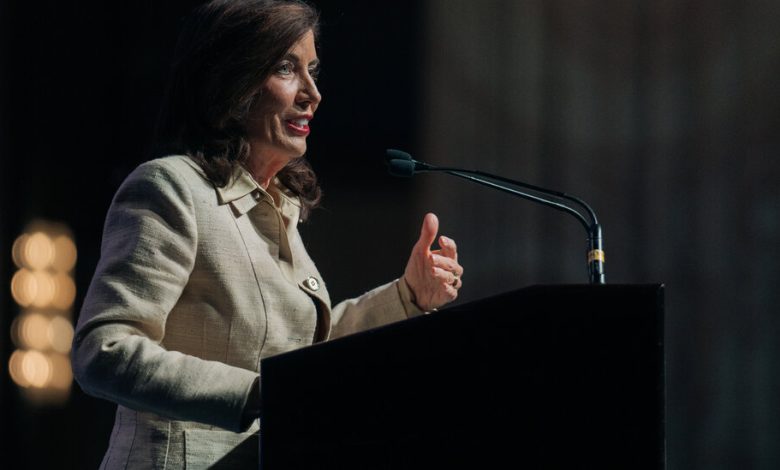Will These Contentious Bills Become Law in New York?

Will New York swear off buying paper from the Amazon rainforest to help stave off its deforestation, or create a commission to study reparations?
Should employers be able to bar workers from going to work for competitors?
A harried last-minute lobbying push to answer these and other questions is accelerating in Albany, where less than two weeks remain for Gov. Kathy Hochul to sign dozens of bills by year’s end. Any legislation not acted upon before then will be automatically vetoed.
This year, state lawmakers passed nearly 900 bills, touching broadly on life in New York. And while Ms. Hochul has acted on most of those measures, roughly a hundred remain, including many of the most consequential and contentious.
One such measure — a proposal to address New York’s history of racial injustice — appears headed for approval. Others are less certain.
Here’s where things stand on some of the most watched pieces of legislation.
Reparations for slavery and racism
Ms. Hochul plans to sign a bill on Tuesday that would establish a task force to study and report on the impact of slavery and racism in New York, and examine the possibility of paying reparations, according to two people familiar with negotiations.
Following the lead of their California counterparts, New York lawmakers voted to create a commission with broad latitude to study the link between historical racism and current disparities in housing, policing, income and incarceration.
Slavery was legal in New York until 1827, but discriminatory practices like redlining continued well into the 20th century. Today, white families in the state have a median net worth almost 15 times that of Black families, according to a recent report from New York City’s comptroller, Brad Lander.
If she approves the measure as expected, the state would not be required to act on the commission’s findings. Even so, proponents are hopeful that the commission’s report will spur productive public dialogue, and create momentum for future action.
Noncompete clauses
One of the most closely watched bills is a proposal to ban noncompete agreements, a hallmark of the high-powered worlds of banking and finance that are central to New York City’s economy.
New York’s legislation is part of a growing national movement to restrict such provisions, which have ballooned in recent years to restrict not only Wall Street traders but also doctors, tattoo artists and even camp counselors.
The prospect of a ban has drawn opposition from powerful industries, including banking and media. A group associated with the Business Council of New York State has spent more than $1 million on ads warning that the legislation would be a “job killer” that would “cripple business’s ability to fuel innovation and retain talent.”
Ms. Hochul has embraced a potential middle ground that would protect lower-wage workers but exclude high earners, although it remains to be seen whether she can reach agreement with the bill’s sponsors.
“We’re working on language that accounts for the difference between the average worker and highly paid executives without fully restricting anyone,” State Senator Sean Ryan, a Democrat and sponsor of the legislation, said of negotiations.
The bill was delivered to Ms. Hochul on Dec. 12, beginning a 10-day clock for her to sign or veto it.
Shedding light into LLCs
The clock is also ticking for two transparency-related measures with the potential to change the way money is spent and disclosed in the state.
The first would require state agencies to post the details of emergency contracts within 30 days of when they are awarded, an effort meant to reduce the risk of waste and corruption. The second would require businesses to list their so-called beneficial owners, a nation-leading effort that would shine a light on the shadowy world of limited liability companies, or LLCs.
Such shell companies help shelter billions of dollars each year, some of it foreign, much of it difficult to trace. Vast sums are tied up in high-end real estate, leaving scores of luxury apartments empty even as the city faces a prolonged housing crisis.
Under the proposed legislation, ownership information would be provided to the state and made public in a searchable database.
“I hope the governor sees the benefit in transparency around the ownership of shell companies, both for the benefit of law enforcement but also tenants and employees,” said State Senator Brad Hoylman-Sigal, a Manhattan Democrat who is the bill’s Senate sponsor. “Most tenants don’t know who their landlord is, and many employees have had their wages stolen by anonymous employers.”
The Real Estate Board of New York said in a statement that it did not oppose disclosing ownership information to the state, but believed that by making such information public, the proposed database would create “privacy and identity theft risks for New Yorkers and risks weakening New York’s economy.”
Ms. Hochul has pledged repeatedly to champion transparency, although she has not yet offered a position on either proposal.
Blocking state spending to save trees
Environmental advocates are pushing another nation-leading measure that would reduce New York’s contribution to climate change. The far-reaching measure would require the state to restrict buying from companies that do not attest that their products have not contributed to deforestation.
The legislation would regulate the supply chains of individual products to ensure they have not been manufactured on land that has recently been forest. Vast amounts of the world’s carbon are stored in tropical forests that also serve as the sites of export for major commodities, including palm oil, cocoa and beef.
The European Union passed a similar ban that is scheduled to take effect in 2025.
New York’s bill would apply to paper and wood, and also the food and beverage products sold by state contractors like Sysco, which has registered to lobby on the bill.
Ms. Hochul presented a scaled-back version of the legislations to proponents last week. But supporters have dismissed the compromise as “unacceptable.”
Changes to wrongful death statute re-emerge
When the Legislature passed the Grieving Families Act last year, proponents celebrated, believing a victory 30 years in the making was at hand.
The bill would rewrite the state’s 1847 wrongful death statute, broadening the category of beneficiaries and allowing courts to evaluate not only a decedent’s earning potential but also the emotional pain caused by their death.
But Ms. Hochul vetoed the bill, saying that while she believed changes should be made, the existing language was overly broad and could have unintended consequences.
This year, lawmakers tried again. They narrowed the bill slightly, limiting damages as well as the category of people who would be eligible for benefits.
“Basically what it does is expand the family members, the way family is thought of in 2023, who can recover damages,” explained Assemblywoman Helene Weinstein, a Brooklyn Democrat and bill sponsor, noting grandparents and domestic partners.
The legislation remains unpopular with the insurance industry, which warns that its passage would send premiums, particularly for medical malpractice policies, skyrocketing.
It remains to be seen if the changes from last year’s version are sufficient to win over the governor. If not, Ms. Weinstein said she intended to try again.
“Laws are like fine wine. Sometimes it’s like a Beaujolais and you introduce it and it passes and sometimes it has to age just right,” she said. “This is one of those that I think has started to reach the end of its aging time.”
Jay Root and Luis Ferré-Sadurní contributed reporting.



